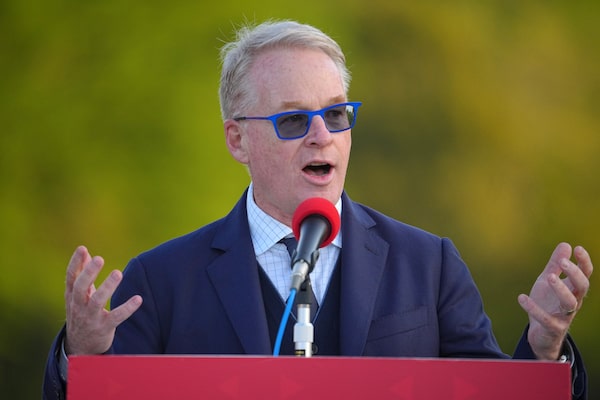
Keith Pelley speaks the award ceremony following day four of the ISPS Handa - Championship at PGM Ishioka GC on April 23, 2023 in Omitama, Japan. According to a report by TSN’s Rick Westhead, Pelley will be named MLSE’s next president and CEO.Yoshimasa Nakano/Getty Images
When Tim Leiweke announced in 2014 that he was stepping down as president and chief executive officer of Maple Leaf Sports and Entertainment, the changes he’d made were just beginning to take hold.
After trying the same thing over and over again, the Leafs had accepted you must change a losing game. After years of being boring and bad, the Raptors had decided to be exciting and good. Toronto FC was a thing that people talked about. It was a different world than the one we live in now.
That contrast extended to the person in charge. Leiweke was big, in every sense of that word. He made as much news as the teams he oversaw. He was involved in each of them on a regular basis. Not in terms of telling people what to do, but in making sure their story was getting out there.
If they didn’t know how to tell it, Leiweke told it for them. While they worried about promising too much, Leiweke would tell reporters he’d already planned the parade route. He set a standard that people around him were forced to pursue.
Those tendencies eventually made him surplus to needs. If a carnival barker was required to turn around the sad-sackingest sports outfit on the continent, ownership preferred a bookkeeper oversee the second phase of his vision. Someone sober and steady and, most importantly, quiet. That person was former airline executive Michael Friisdahl.
Friisdahl ran Toronto’s biggest sports concern for years and I defy anyone in the city to pick him out of a one-man lineup. He was the anti-Leiweke.
He quit nearly two years ago. Since it had never really registered with the public that Friisdahl had arrived, there was no need to rush out and replace him now that he’d left.
In the decade since Leiweke punched his own ticket, there has been no real sports oversight at MLSE. Various factions of ownership show up and take credit when there’s credit to be taken (a lot less need for that recently). But no one’s riding herd over the fiefdoms that make up the country’s largest sports-entertainment business. No one’s out there making promises that must be kept.
That appears to have changed.
According to a report on Wednesday by TSN’s Rick Westhead, Keith Pelley will be named MLSE’s next president and CEO.
Pelley will arrive with pedigree (he was born and raised here), as well as a strong resume in sports media (at Rogers Inc.) and sports administration (at golf’s European Tour). But what he really brings is personality.
When he last lived in Toronto, shortly after he spearheaded Rogers’s decision to blow far too much money on NHL rights, you could not escape the guy. If it vaguely touched on sports in this country, he had an opinion on it and was champing to share it.
Most high-ranking sports executives are theoretical. You know they exist because you’ve seen their picture, but try getting hold of one. Bigger challenge – try getting one to offer up something substantive on the record.
They know that anything they say can and will be used against them in a non-court of sports law. Smarter to say nothing, ever. Unless you’re in trouble. Then they can never shut up.
Leiweke was not that guy. As a result, his teams could not blend into the wallpaper after another mediocre season. They were either changing and getting better or they were making the boss look like a liar. It was an effective spur to organizational progress. The muscle memory built up during his tenure was resilient.
But eventually all of MLSE’s properties sank back into torpor. They aren’t all bad. They’re just not good. Worse, they don’t seem terribly bothered by that fact.
Based on his past M.O., Pelley is a sort of Leiweke 2.0. It is difficult to imagine him hiding in his office when things go wrong, letting his team presidents tell their general managers to tell their coaches to tell their players to say something.
If Pelley is out there talking – it doesn’t really matter what he’s talking about – then the pressure from above has resumed. Because there is no world in which the MLSE CEO gets on talk radio and is not raked about the Leafs’ performance or the Raptors’ decisions or the fact that someone abducted Toronto FC and no one’s bothered to put up a single ‘Missing’ poster.
If the boss talks often enough, he will eventually say something his teams have to respond to. Rather than engage in rhetorical judo with a man who kills that way for a living, it’s probably easier to just win.
This sort of triangulated pressure – from fans, media and ownership – hasn’t existed in Toronto for years.
If the MLSE board thought things were going great, they could have put another invisible man or woman in charge.
That they have planted a high-profile human bullhorn in the C-suites at 40 Bay St. suggests someone believes a little reassembly is required.
No CEO of a sports anything ever won a title, but an effective one can apply downward pressure. Applied steadily and without favour, people may begin to fear that elaborate promises to try harder next year are not going to cut it anymore.
That doesn’t mean things will get better. Loosing a cannon on the deck of sports’ sleepiest frigate could make things worse. Either way, it’s a lot more interesting than what’s (not) been going on recently.
 Cathal Kelly
Cathal Kelly